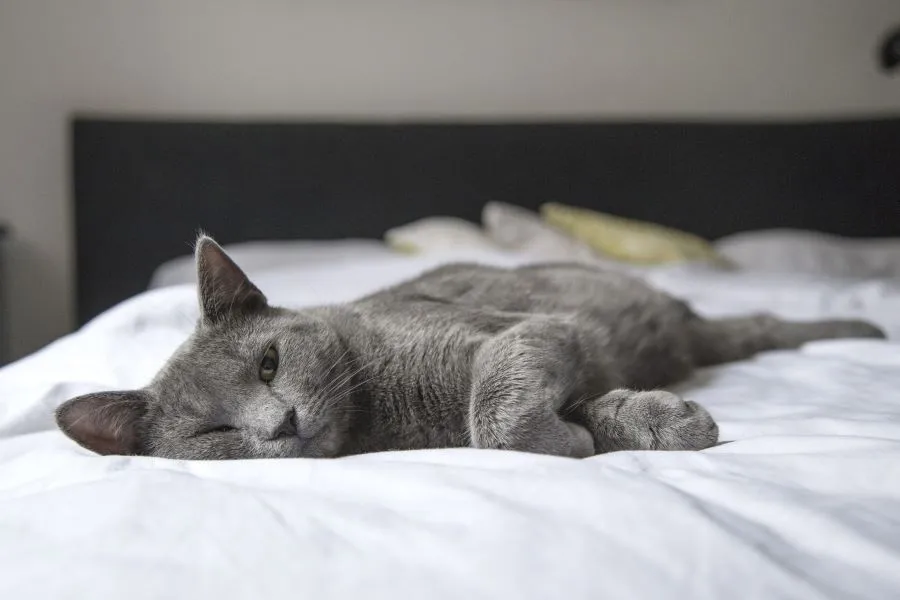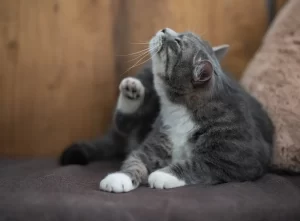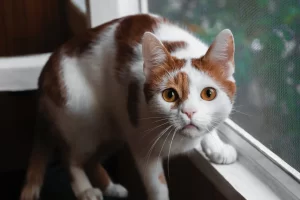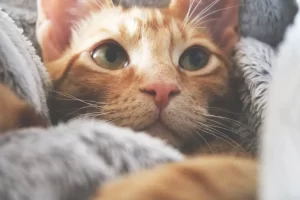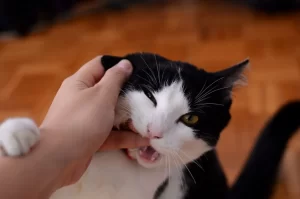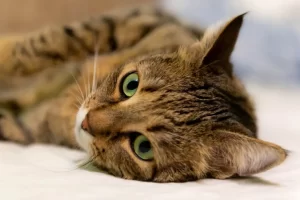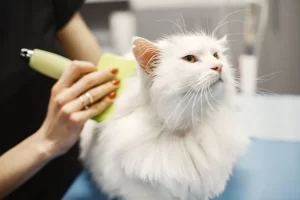Welcome to our comprehensive guide on home remedies for cat peeing on bed. If you’re a cat owner who’s struggling with the frustrating behavior of finding your feline friend urinating on your bed, you’re not alone. Inappropriate urination on the bed is a common issue among cats and can be caused by various factors, including medical issues, stress, anxiety, territorial marking, or litter box aversion. While it can be concerning and inconvenient, the good news is that there are home remedies and practical solutions that can help address this behavior. In this article, we will cover the most important topics related to home remedies for cat peeing on bed, including understanding the underlying causes, things to avoid, frequently asked questions, and more. So, let’s dive in and learn how to effectively tackle this issue and keep your bed pee-free!
Table of Contents
ToggleWhy Is My Cat Peeing on My Bed?
When it comes to addressing cat peeing on the bed, it’s important to understand the underlying causes that may be contributing to this behavior. Medical issues, such as urinary tract infections or bladder problems, can cause discomfort and urge a cat to urinate in inappropriate places, including the bed. Stress and anxiety can also trigger inappropriate urination in cats, as they may resort to marking their territory when feeling threatened or anxious. Territorial marking, especially in unneutered males, can be a common cause of bed peeing as they try to establish their territory.
Litter box aversion is another possible cause of cats peeing on the bed. If the litter box is dirty, in an inconvenient location, or has an unpleasant odor, cats may avoid using it and choose to pee on the bed instead. It’s crucial to identify and address any possible underlying causes to effectively tackle the issue of cat peeing on the bed.
To determine the underlying cause, a thorough evaluation by a veterinarian is recommended. The vet can conduct a physical examination, run tests to rule out any medical issues, and provide appropriate treatment if necessary. If stress or anxiety is suspected, identifying and addressing potential triggers, such as changes in the household, new pets, or environmental changes, can help alleviate the issue. Ensuring that the litter box is clean, accessible, and appealing to the cat, with appropriate litter type and box size, can also help in resolving litter box aversion.
In some cases, addressing the underlying cause may be sufficient to resolve the issue of cat peeing on the bed. However, in more complex situations, additional behavioral modifications and home remedies may be needed to reinforce appropriate urination behaviors. It’s essential to understand that each cat is unique, and what works for one cat may not work for another. Patience, consistency, and observing the cat’s behavior closely are key to identifying and addressing the underlying causes and effectively resolving the issue of cat peeing on the bed.
Best Home Remedies to Stop Cat from Peeing On Your Bed
- Clean thoroughly: Cats are known to be sensitive to smells, so it’s important to thoroughly clean the areas where your cat has peed on the bed. Use an enzyme-based cleaner specifically designed for removing pet urine odors. Avoid using ammonia-based cleaners, as they can actually attract cats to pee in the same spot.
- Provide a litter box: Ensure that your cat has easy access to a clean, well-maintained litter box. Cats are more likely to use the litter box if it’s in a convenient location and kept clean. It’s generally recommended to have one litter box per cat, plus an additional one, and to scoop the litter at least once a day.
- Use a deterrent spray: There are commercially available deterrent sprays that are formulated to discourage cats from urinating on certain surfaces. You can spray these on your bed or other areas where your cat has peed. These sprays typically have a strong odor that cats find unpleasant.
- Make the bed unattractive: Cats are less likely to pee on a bed that is unattractive to them. You can try placing aluminum foil, double-sided tape, or a plastic carpet runner with the pointy side up on the bed to deter your cat from jumping on it. Cats generally don’t like the feel of these materials under their paws.
- Provide an alternative surface: Consider providing your cat with an alternative surface to pee on, such as a litter box, a pee pad, or a designated area with an appropriate surface, like a plastic tray filled with sand or soil. Encourage your cat to use this alternative surface by placing treats or toys nearby to create a positive association.
- Manage stress: Stress can be a trigger for inappropriate urination in cats. Provide your cat with a stress-free environment by maintaining a consistent routine, providing hiding spots, and engaging in regular play and interactive sessions. If you suspect your cat is stressed, consider using pheromone diffusers or consulting with a veterinarian for further advice.
- Create a Positive Association with the Bed: Cats may avoid peeing on surfaces that they associate with pleasant experiences. You can try placing items that your cat enjoys, such as a soft blanket, a favorite toy, or a piece of clothing with your scent on it, on the bed. This can create a positive association with the bed and discourage your cat from peeing on it.
- Cover the Bed with a Plastic Sheet: Cats generally do not like the feel of plastic under their paws, so covering the bed with a plastic sheet can be a deterrent. Use a plastic sheet that is large enough to cover the entire surface of the bed and secure it tightly. You can also place a fitted sheet or a mattress cover over the plastic sheet to make it more comfortable for human use.
- Change the Bedding Material: Cats may be more inclined to pee on certain types of bedding materials. If your cat has been peeing on your bed, try changing the type of bedding material. For example, if you have been using fabric or cloth bedding, switch to vinyl or rubberized bedding, as these materials are less absorbent and may discourage your cat from peeing on the bed.
- Use Citrus Scents or Sprays: Cats are known to dislike the smell of citrus. You can use citrus-scented sprays or place citrus peels or cotton balls soaked in citrus oil on the bed to create a scent barrier that may deter your cat from peeing on the bed. Be sure to use cat-safe citrus scents and avoid using concentrated oils or sprays directly on your cat’s skin or fur.
- Increase Vertical Space: Cats are natural climbers and often prefer to be in elevated spaces. Providing vertical spaces, such as cat trees or shelves, near the bed can give your cat an alternative place to rest and may discourage them from peeing on the bed. Make sure the vertical spaces are easily accessible and appealing to your cat with cozy beds or hiding spots.
- Restrict Access to the Bedroom: If your cat continues to pee on the bed despite other efforts, consider restricting your cat’s access to the bedroom. You can close the bedroom door or use a baby gate to prevent your cat from entering the room. This can be a temporary solution while you work on addressing the underlying cause of the behavior.
- Offer Multiple Litter Box Options: Cats may avoid using the litter box if they don’t like the location, size, or type of litter box. Try providing multiple litter boxes in different locations throughout your home, including one in or near the bedroom. Use litter boxes with different styles, sizes, and types of litter to see what your cat prefers. Keep the litter boxes clean and ensure they are easily accessible to your cat.
- Provide Environmental Enrichment: Boredom and lack of mental stimulation can contribute to stress and inappropriate urination in cats. Provide your cat with environmental enrichment, such as puzzle toys, scratching posts, and interactive play sessions, to keep them mentally and physically stimulated. This can help reduce stress and decrease the likelihood of your cat peeing on the bed.
- Address Any Medical Issues: If your cat is repeatedly peeing on the bed, it’s important to rule out any underlying medical issues that may be causing the behavior. Urinary tract infections, bladder stones, and other medical conditions can cause discomfort and lead to inappropriate urination. Consult with your veterinarian to rule out any medical issues and receive appropriate treatment if needed.
Things to Avoid When Cat Pee On Your Bed
Here are the main things to avoid in order to prevent exacerbating the issue. Here are some important points to consider:
- Punishment: Avoid punishing your cat for peeing on the bed. Cats do not respond well to punishment, and it can increase their stress levels and worsen the issue. Punishment may also cause the cat to hide their peeing behavior, making it difficult to identify and address the underlying cause.
- Strong-smelling cleaning products: Avoid using strong-smelling cleaning products, especially those containing ammonia or bleach, to clean the urine spots on the bed. These odors may resemble the scent of cat urine, and the cat may be encouraged to mark the spot again. Instead, use enzyme-based cleaners specifically designed for pet urine, which can break down the odor and eliminate it effectively.
- Using repellents or deterrents: Avoid using repellents or deterrents on the bed or in the bedroom to discourage the cat from peeing. These may contain chemicals that are harmful to cats, and using them may not address the underlying cause of the inappropriate urination behavior.
- Blocking access to the bed: Avoid blocking access to the bed or using physical barriers to prevent the cat from peeing on it. This may increase the cat’s stress and anxiety, and they may resort to finding other areas to urinate in the house.
- Ignoring changes in behavior: Avoid ignoring any changes in your cat’s behavior or urinary habits. If your cat starts peeing on the bed or exhibits any other unusual behaviors, it’s essential to pay attention and investigate the underlying cause promptly.
- Neglecting litter box hygiene: Avoid neglecting the cleanliness of the litter box. Regularly clean the litter box, remove clumps and feces, and replace the litter as needed. Neglecting litter box hygiene can lead to aversion and may trigger inappropriate urination behavior.
Frequently Asked Questions (FAQs) about Cat Peeing on the Bed
Why is my cat peeing on the bed?
There can be several reasons why a cat may pee on the bed, including medical issues, stress or anxiety, territorial marking, or litter box aversion. It’s important to identify the underlying cause to effectively address the issue.
How can I stop my cat from peeing on the bed?
The approach to stopping a cat from peeing on the bed depends on the underlying cause. It may involve addressing any medical issues, reducing stress or anxiety, providing a clean and accessible litter box, and using positive reinforcement for desired urination behaviors.
Should I punish my cat for peeing on the bed?
No, punishment is not recommended as it can increase stress and anxiety in cats and worsen the issue. Punishment may also cause the cat to hide their peeing behavior, making it difficult to identify and address the underlying cause.
Can I use repellents or deterrents to prevent my cat from peeing on the bed?
It’s generally not recommended to use repellents or deterrents on the bed or in the bedroom, as they may contain chemicals that are harmful to cats. These may not address the underlying cause of the inappropriate urination behavior and may not be effective in preventing the cat from peeing on the bed.
How often should I clean the litter box to prevent my cat from peeing on the bed?
It’s important to clean the litter box regularly, ideally once or twice a day, and completely replace the litter at least once a week. Neglecting litter box hygiene can lead to aversion and may trigger inappropriate urination behavior.
Can stress or anxiety cause my cat to pee on the bed?
Yes, stress or anxiety can be a common underlying cause of cats peeing on the bed. Identifying and addressing potential stressors, such as changes in the household, new pets, or environmental changes, can help alleviate the issue.
Should I confine my cat to a specific area to prevent bed peeing?
Confining a cat to a specific area may increase their stress and anxiety, and they may resort to finding other areas to urinate in the house. It’s important to address the underlying cause and provide a clean and accessible litter box to promote appropriate urination behavior.
What type of cleaning products should I use to clean urine spots on the bed?
It’s recommended to use enzyme-based cleaners specifically designed for pet urine, which can break down the odor and eliminate it effectively. Avoid using strong-smelling cleaning products containing ammonia or bleach, as they may resemble the scent of cat urine and encourage the cat to mark the spot again.
Can my cat’s diet affect their urination behavior?
Yes, a cat’s diet can affect their urination behavior. Feeding a balanced and appropriate diet, providing enough water, and avoiding foods that may irritate the urinary tract can help maintain urinary health and prevent urination issues.
When should I seek professional help for my cat’s bed peeing behavior?
If the bed peeing behavior persists despite trying home remedies and behavioral modifications, or if you notice other concerning signs, such as blood in the urine, frequent urination, or straining, it’s important to seek professional help from a veterinarian or a qualified feline behaviorist for a thorough evaluation and appropriate treatment.

